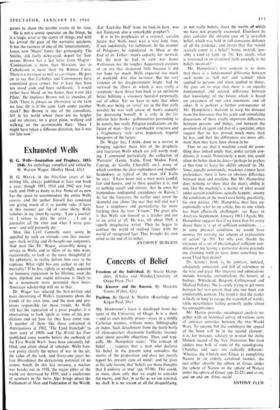Exhausted Wells
H. G. Wells—Journalism and Prophecy, 1893- 1946. An anthology compiled and edited by W. Warren Wagar. (Bodley Head, 42s.)
H. G. WELLS, in the fifty-four years of his writing life, always published at least one book a year, though 1895, 1914 and 1942 saw four each, and 1940 as many as five. None of us now has the space to accommodate the entire Wells oeuvre, and the author himself has condoned our giving much of it to jumble sales (I have in this manner got rid of some thirty Wells volumes in my time) by saying: 'I am a journal- ist. I refuse to play the artist . . . I am a journalist all the time and what I write goes now—and will presently die:
Men like Cyril Connolly must surely be appalled by such an attitude—one that encour- ages slack writing and ill-thought-out judgments. And men like Dr. Wagar, ostensibly doing a service to Wells and to thtse of us who want, occasionally, to look at the more thoughtful of his ephemere, in reality deliver him over to the captious. What right has any author to opt for mortality? If he has, rightly or wrongly, acquired an immense reputation in his lifetime, even the most slipshod and stupid utterance is likely to be a monument more perennial than brass. American scholarship will see to that.
Dr. Wagar has selected the best-written and most interesting of Wells's statements about the trends of his own time, and the men and pro- cesses responsible for those trends. As Wells still has the reputation of a great prophet, it is entertaining to look again at some of his pre- dictions and see how far they have come true. A number of them—like those contained in Anticipations in 1902, 'The Land Ironclads' (a short story of 1903), and The World Set Free (published some months before the outbreak of the First World War)—have been uncannily ful- filled, and often ahead of schedule. Wells fore- saw pretty clearly the nature of war in the air, the value. of the tank, and (forty-one years be- fore Hiroshima) the devastating potential of an atomic bomb. In this last instance, a nuclear war breaks out in 1958, the major cities of the world are destroyed by 1959, and a conference of survivors in the Swiss Alps brings about the Parliament of Men and Federation of the World.
(Let `Locksley Hall' have its look-in here; was not Tennyson also a remarkable prophet?)
It is in his prophecies of a rational, socialist future that Wells must wait a very long time, if not indefinitely, for fulfilment. In the manner of Pelagians, he repudiated—in Mind at the End of its Tether—man's capacity for survival, but the man he had in view was homo Wellsianus, not the tougher Augustinian creature of an era that despaired little because it did not hope for much. Wells expected too much of mankind; hint- illae lacrimae. But the very violence of his disappointment might—had he survived the illness of which it was really a symptom—have thrust him back to an optimism better befitting a visionary Socialist perpetually out of office. Yet we have to note that when Wells was being an 'artist' (as in the fine early novels), he was well aware of man's capacity for destroying himself. It is only in the far inferior later books—gallimaufries pretending to be novels, but really Pelagian meditations on the future of man—that a ramshackle structure and a fragmentary style serve hopelessly hopeful blueprints of the future.
Dr. Wagar has, I think, done us a service in bringing together those bits of the prophetic and tractarian Wells which are still worth read- ing. I commend particularly the collection of 'Portraits' (Lenin, Stalin, Ford Madox Ford, Conrad, de Gaulle, Churchill, etc.), many of which combine the clear-sightedness and muddle- headedness so typical of the man. (Of Stalin he says: 'I have never met a man more candid, fair and honest, and to these qualities it is, and to nothing occult and sinister, that he owes his tremendous undisputed ascendancy in Russia.') As for the forecasts, the earlier ones (even the shameful one about 'the war that will end war') have a toughness and particularity far more fetching than the later 'Visions.' The great pity is that Wells saw himself as a teacher and not as an artist at all. He was, till about 1918, a superb imaginative writer. Then he began to confuse the world of realised fancy with the world of recognised fact. That brought his own mind to the end of its tether.
ANTHONY BURGESS


































 Previous page
Previous page